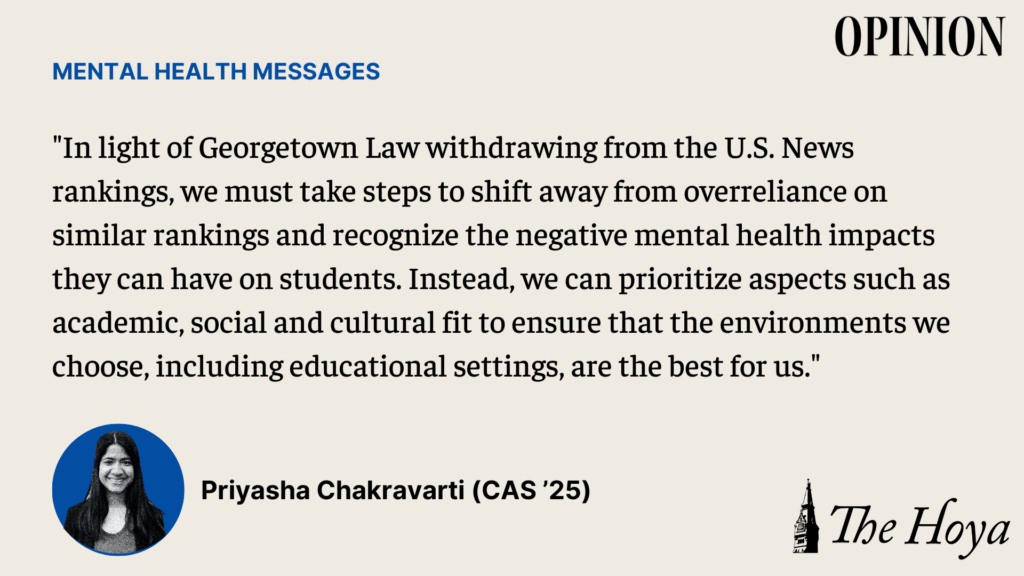Georgetown University Law Center withdrew from the U.S. News & World Report law school rankings in November 2022 alongside several other top institutions including Columbia, Yale and Harvard Law schools. These schools cited the rankings’ overemphasis on standardized testing score averages and endowment size, as well as their undervaluing of an institution’s commitment to public service — and they are certainly onto something.
The U.S. News Report rankings prioritize standardized test scores, graduate employment and education-related expenditures per student. But even though these rankings help universities maintain their institutional prestige and offer useful information that helps students compare schools, they should not be used as the sole indicator of the successes one can achieve at any given institution, nor of that institution’s accomplishments.
Rankings like the U.S. News’ are not necessarily based on meaningful aspects of a university’s offerings. Moreover, the rankings can perpetuate highly competitive cultures among high schoolers and beyond, which can lead to increased levels of stress, anxiety and depression.
In light of Georgetown Law withdrawing from the U.S. News rankings, we must take steps to shift away from overreliance on similar rankings and recognize the negative mental health impacts they can have on students. Instead, we can prioritize aspects such as academic, social and cultural fit to ensure that the environments we choose, including educational settings, are the best for us.
It is common for students to emphasize rankings over more tangible factors such as academic offerings, location, financial aid and school size when applying to colleges. A University of Michigan first-year student body profile that surveyed incoming first-years found that 86.7% chose the university because of its reputation as a prestigious institution.
A common sentiment among high school students at my international school in the Philippines was the notion of “go big or go home.” To us, this meant that if we were going to be paying so much money to study in the United States so far away from home, we needed to be attending a well-ranked — and preferably top 20 — institution.
Hence, I was surrounded by a culture where students felt scared to reveal their final decisions, in fear of judgment that their school was not prestigious enough.
This culture can be detrimental to students’ self-esteem and mental health, especially if they are rejected from their top choices. They may be forced into chasing rankings and setting unrealistic standards for themselves rather than focusing on their passions and potential happiness in college, leading to a rise in stress levels, anxiety and depression among students.
This reliance on rankings does not stop with college admissions. Rankings are all around us. Even when applying for internships and graduate school, students may consider the prestige and reputation of their programs over role descriptions, flexibility and work culture.
This culture of prioritizing rankings throughout our lives emerges partly from being in competitive environments — facing pressure from friends, family and counselors to chase “good names” — but also from consuming the information that universities promote in advertisements, brochures and campus tours that boast rankings and statistics.
When choosing schools, academic, social and cultural fit are more dependable concepts than rankings. While I was applying to Georgetown, for example, it was obvious that this is one of the best-ranked universities in the country for my fields of study — politics and economics. However, this can also be said about many other institutions and thus does little to differentiate the Hilltop from these other schools. So, I spent a lot of time researching the environment, prioritizing qualities like its medium size, its proximity to internship opportunities in Washington, D.C., its unique course offerings in theology and the presence of its Model United Nations team.
We can all take steps to encourage each other to shift our mindset from prioritizing rankings to looking at the work environment and culture of institutions we may move on to — be it for internships, jobs or graduate schools — so that we can help each other become fulfilled individuals. On this campus, this would take the form of students celebrating acceptances and achievements no matter how large or small and counselors emphasizing factors other than rankings when advising about post-college opportunities.
Making this change would foster a more supportive environment that is conducive to our mental and intellectual well-being, something that will improve student experiences on this campus better than any ranking boost could.
Priyasha Chakravarti is a sophomore in the College. Mental Health Messages is published every third Friday.



















